(TN&MT) - On the afternoon of November 5th, at the National Assembly building, under the chairmanship of National Assembly Chairman Tran Thanh Man , the National Assembly heard the report explaining, receiving feedback, and revising the draft Law on Geology and Minerals; and discussed in the plenary session some contents of the draft Law on Geology and Minerals that still have differing opinions.
On behalf of the Standing Committee of the National Assembly, the Chairman of the Committee on Science , Technology and Environment, Le Quang Huy, reported on several major issues regarding the explanation, acceptance, and revision of the draft Law on Geology and Minerals.
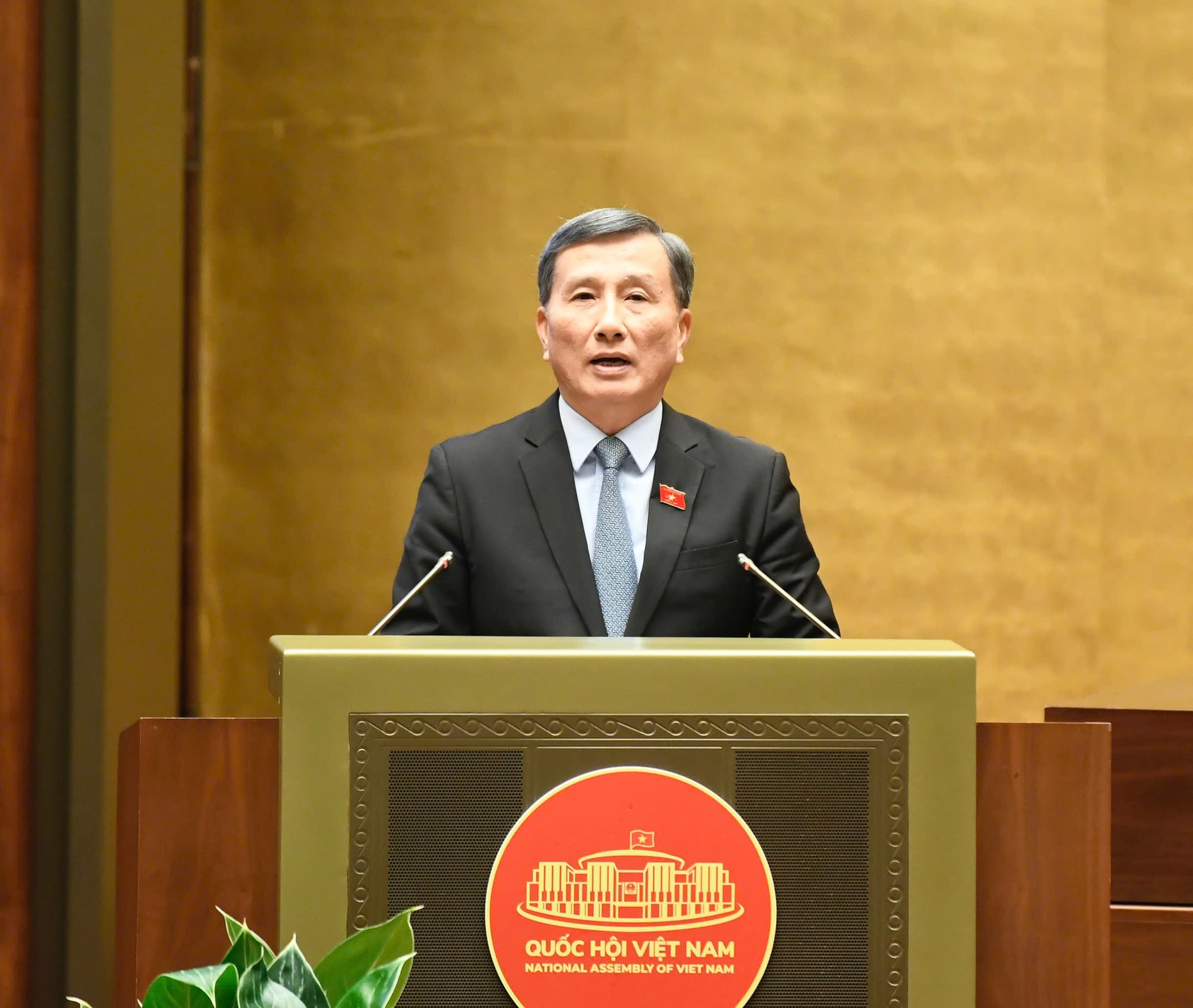
Regarding the state's policy on geology and minerals (Article 3)
Some have suggested removing Clause 4 to align with Clause 1 of Article 7 of the State Budget Law; clearly specifying the percentage to be retained from revenue from mineral exploitation, and the principles for deducting and remitting these revenues.
Regarding this matter, the Standing Committee of the National Assembly reports as follows: The provision of State policy in Clause 4, Article 3 aims to institutionalize the viewpoint stated in Resolution No. 10 of the Politburo. Taking into account the opinions of National Assembly deputies, the content of Clause 4 has been revised and is reflected as in the draft Law. The allocation of funds will be carried out according to the state budget estimates, in accordance with the Law on State Budget.
Regarding the rights and responsibilities of localities, communities, households, and individuals in areas where geological and mineral resources are exploited (Article 8)
There is a suggestion to add a regulation requiring organizations and individuals exploiting minerals to annually support the costs of investment, upgrading, maintenance, infrastructure construction, and environmental protection, in order to further enhance the responsibility of mineral exploitation organizations.
According to Le Quang Huy, Chairman of the Committee on Science, Technology and Environment, there are two types of opinions on this matter:
First opinion: Add point d to clause 1 of Article 8 according to Option 1 as in the draft Law (the Government proposes the addition).
This opinion would have the advantage of creating a legal basis to compel organizations and individuals exploiting minerals to fulfill their responsibility to provide financial support for the upgrading, maintenance, and construction of technical infrastructure and environmental protection works in the area, at a level determined by the provincial People's Council.
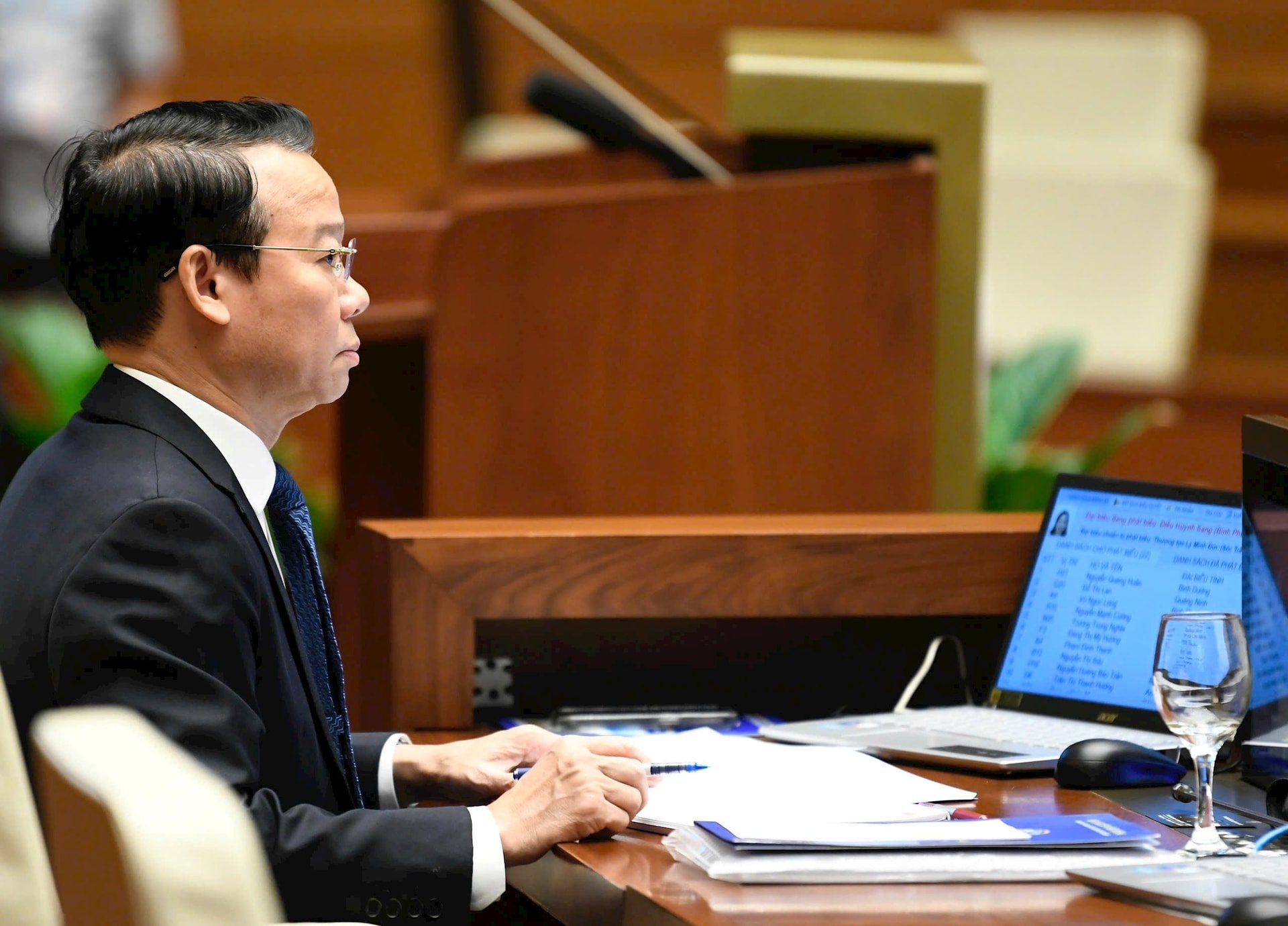
However, a drawback is that this regulation shifts from the voluntary support responsibilities under the current Mineral Law to mandatory support responsibilities, a new policy whose impact has not yet been assessed.
In addition, the lack of regulations on fee levels can easily lead to arbitrary application.
At the same time, allowing "the portion of financial support provided by organizations and individuals exploiting minerals to be accounted for as production costs" is inconsistent with the Corporate Income Tax Law and contradicts the principle that deductible expenses when determining taxable income are those directly related to production and business activities.
Furthermore, organizations and individuals exploiting minerals have already paid their taxes, fees, and mineral exploitation rights fees to the State budget. The State regulates and allocates the budget according to the provisions of the Law on State Budget to maintain and upgrade infrastructure and protect the environment (if it is not appropriate, these revenues need to be adjusted upwards). Therefore, mandating that organizations and individuals exploiting minerals provide support is unfair to other economic sectors and creates a cost burden for those exploiting minerals.
Second type of opinion: Maintain the current regulations of the Mineral Law according to Option 2 in Clause 3, Article 8 of the draft Law.
The advantage is that no new policies will be introduced. It ensures the nature of financial support (allowing organizations and individuals exploiting minerals to fulfill their responsibility to provide support, but the level of support is voluntary).
Regarding the drawbacks, this approach could easily lead to organizations and individuals exploiting minerals acting arbitrarily in fulfilling their support responsibilities (not being mandatory). Currently, few localities have implemented this policy, and there are differences in the regulations regarding the responsibility (mandatory or voluntary) of organizations and individuals exploiting minerals.
Accordingly, Le Quang Huy, Chairman of the Committee on Science, Technology and Environment, stated that the Standing Committee of the National Assembly proposed that the National Assembly consider and provide feedback on this matter.
Regarding the responsibility for mineral resource planning (Article 14)
During the discussions at the 7th Session of the National Assembly's specialized working group, and in the process of researching, incorporating, and revising the content regarding the assignment of responsibilities to the lead agency for mineral resource planning, there were still many differing opinions.
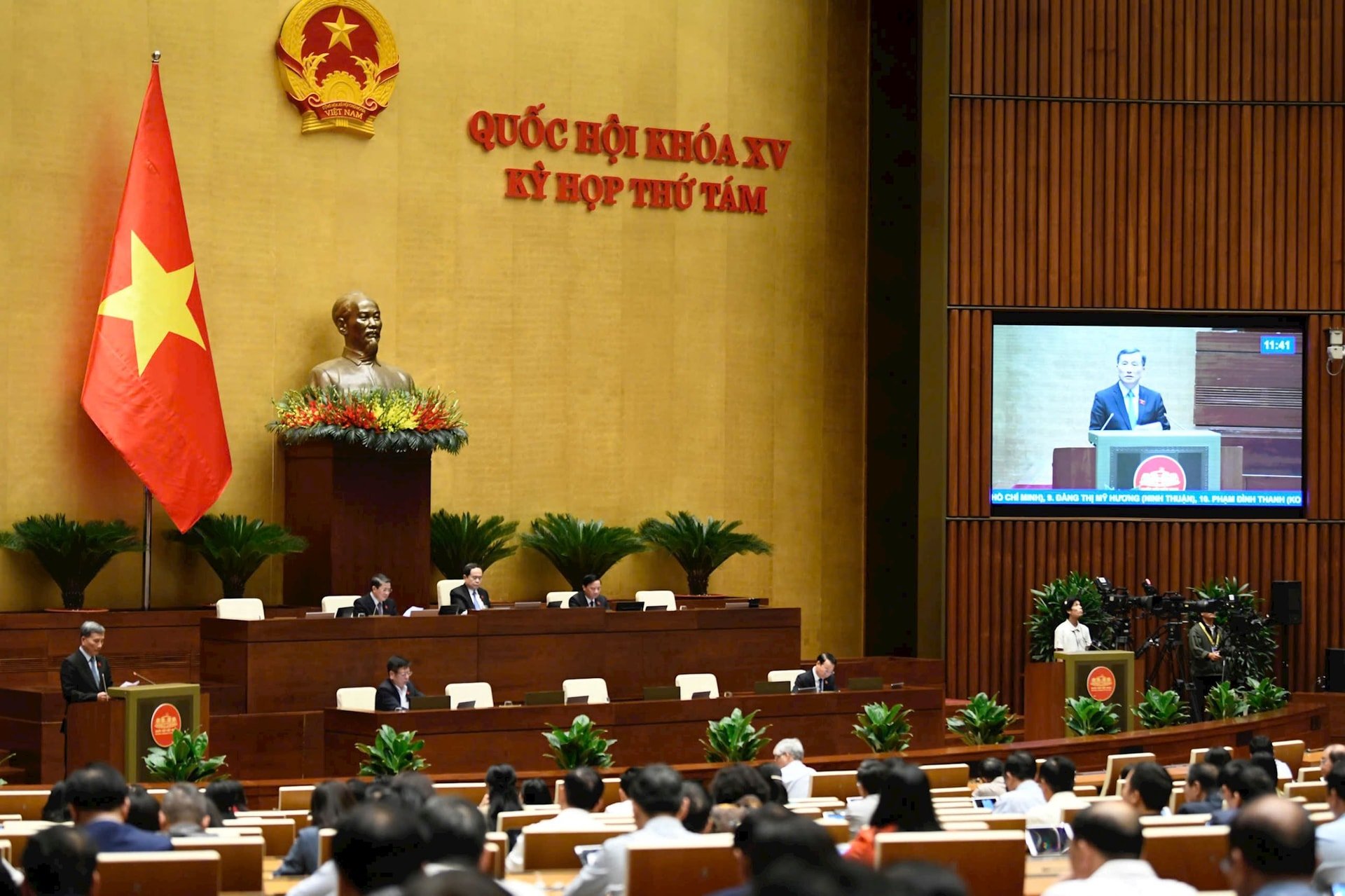
The Standing Committee of the National Assembly directed the lead agency responsible for verification and the lead agency responsible for drafting the draft to present two options for comments. Based on the synthesis of opinions and analysis of the advantages and disadvantages of each option, the Standing Committee of the National Assembly and the Government agreed to report to the National Assembly on the regulation of one option (Option 1 with adjustments) in the direction of: assigning the Government to appoint an agency to organize the preparation and submission of the mineral resource plan to the Prime Minister for approval; and stipulating that the preparation of a geological and mineral resource management plan be integrated into the provincial planning (Article 14 of the draft Law).
Regarding adjustments to mineral resource planning (Article 15)
Some opinions suggested that the adjustment of the planning should be carried out in accordance with the law on planning , while others proposed that specific regulations be included in the draft Law to promptly address practical difficulties and the unique characteristics of basic geological and mineral resource surveys. The Standing Committee of the National Assembly directed the lead agency responsible for verification and the lead agency responsible for drafting the draft Law to present two options for consideration. To promptly address the adjustment of the planning and resolve practical difficulties and inadequacies, the Standing Committee of the National Assembly and the Government agreed to report to the National Assembly for consideration the option of allowing partial adjustment of the mineral resource planning content.
Regarding the principles for granting mineral exploration licenses (Article 45)
Some have suggested that the principles for granting mineral exploration licenses should be consistent with the national mineral planning and the national energy master plan to address practical issues related to coal.
Chairman Le Quang Huy stated that, in response to feedback from National Assembly deputies, the Standing Committee of the National Assembly has added a transitional provision to Clause 7, Article 116 of the draft Law.
There is a suggestion to amend point h, clause 1, Article 45, which stipulates that "Each organization may be granted no more than 05 exploration licenses for a type of mineral, excluding expired mineral exploration licenses, except for coal/energy minerals," because limiting the number of exploration licenses to only 05 would significantly impact planned coal exploration projects and national energy security.
Regarding this matter, the Standing Committee of the National Assembly would like to report as follows: The draft Law inherits the provisions on the number of exploration licenses from the current Law to limit speculation and hoarding of mines, and there have been no difficulties in the implementation of the 2010 Mineral Law. The exclusion of provisions for coal/energy minerals is inconsistent across different groups and types of minerals in the granting of mineral exploration licenses. Based on the opinions of National Assembly deputies, the Standing Committee of the National Assembly proposes amending the provisions in point h, clause 1, Article 45 to allow the Prime Minister to decide on cases where an organization requests more than 5 exploration licenses for a single type of mineral. Therefore, the Standing Committee of the National Assembly requests the National Assembly's opinion on this matter.
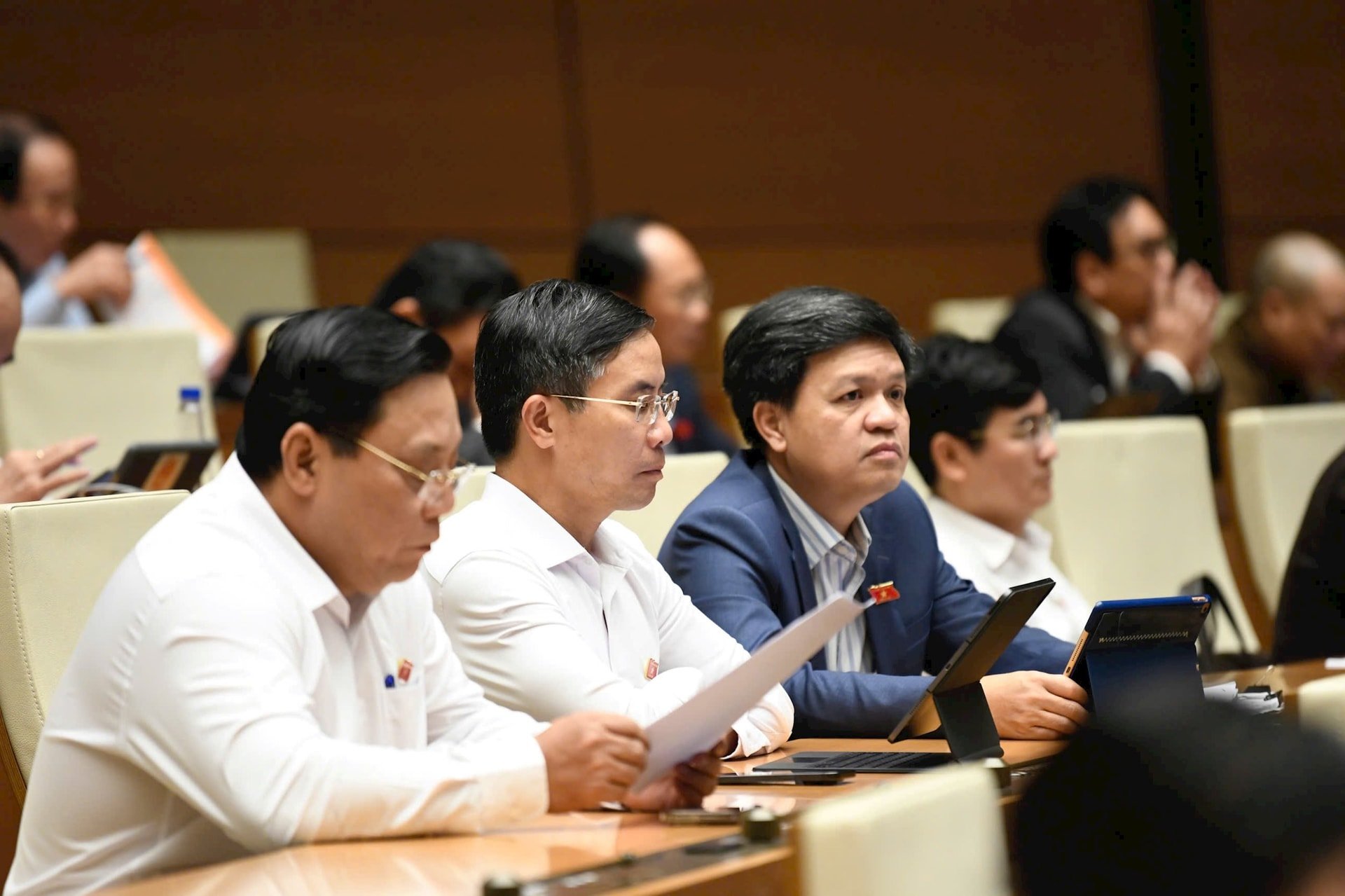
Regarding the management of Group IV (Group 4) minerals.
Some opinions suggest that the regulations on licensing procedures for exploration and exploitation of minerals used as leveling materials should not be abolished, to avoid creating legal loopholes that could lead to violations and affect the effectiveness and efficiency of state management in the mineral sector; it is necessary to consider granting mining licenses for Group IV minerals instead of implementing a registration-based system.
Responding to the opinions of National Assembly deputies, the Standing Committee of the National Assembly directed that " for Group IV minerals, it is necessary to study and establish specific regulations related to planning, exploration, and exploitation to prevent policy abuse . " The Standing Committee of the National Assembly and the Government agreed to maintain licensing regulations but simplify the process and procedures for Group IV minerals in order to unlock resources and promote socio-economic development. In addition, the draft Law has revised the principles for exploiting Group IV minerals in Clause 2, Article 75.
To address the planning bottleneck and thoroughly resolve procedural obstacles, the draft Law stipulates that Group IV minerals will not be included in provincial planning. The draft Law has revised Article 75, specifically stating that projects specified in Clause 2 of Article 74 are not required to prepare investment projects for mineral exploitation to obtain investment approval; nor are they required to undergo the procedures for appraisal and approval of environmental impact assessment reports and environmental permits. Except for projects meeting these criteria, other projects must still fully comply with the regulations, ensuring strict adherence to the rules.
Regarding fees for mineral exploitation rights (Article 101)
Some argue that the regulations on mining concession fees are impractical and not in line with reality; some suggest removing the provision for collecting mining concession fees and considering increasing the mineral resource tax; others propose clarifying the difference between mining concession fees and resource tax and suggesting solutions to reduce administrative procedures .
The Standing Committee of the National Assembly would like to explain as follows: Regarding the proposal to remove the content on collecting fees for mineral exploitation rights and to consider increasing the mineral resource tax rate: The Standing Committee of the National Assembly recognizes that, after 13 years of implementation, the "Mineral Exploitation Rights Fee" policy has contributed to limiting speculation, retaining mines for transfer, selecting investors with sufficient financial capacity, and is also a significant source of revenue for the state budget. To address current limitations and obstacles, the draft Law stipulates that the fee for mineral exploitation rights will be collected annually and settled based on actual production output. With the above regulation, the fee for mineral exploitation rights will not be affected by geological reserves, unexploited reserves, or reserves that cannot be fully exploited; or by objective reasons preventing the mine from being put into operation.
Regarding the difference between mineral exploitation fees and resource tax: For resource tax, organizations and individuals self-declare their actual mining output and pay monthly, with annual settlement. For mineral exploitation fees, the draft law stipulates that the state management agency will approve based on mineral reserves, and organizations and individuals will pay once at the beginning of the year, with settlement based on actual mining output over a period (which could be 1 year, 3 years, or 5 years). Any excess mineral exploitation fee paid will be carried over to the next payment period; any underpayment will be supplemented.
Regarding administrative procedures: For mineral exploitation rights fees, based on the approval decision and resource tax settlement, organizations and individuals only need to pay once a year, eliminating the need for additional administrative procedures in declaring and paying mineral exploitation rights fees.
Regarding auction areas, the right to exploit mineral resources will not be auctioned (Article 103).
Many opinions have focused on the criteria for designating areas where mineral exploitation rights will not be auctioned.
Taking into account the opinions of National Assembly deputies, the draft Law has been revised to stipulate the principles for granting mineral exploitation licenses without auctioning the right to exploit minerals (Clause 2, Article 103), and on that basis, assigns the Government to regulate the criteria for delineating areas where the right to exploit minerals will not be auctioned (Clause 5, Article 103).
Regarding some other matters
There is a suggestion to add point h to Clause 1, Article 218 of the Land Law: "Land designated for mineral resources with a wide distribution area (such as bauxite, titanium) shall be considered for use planning by the Provincial People's Committee in combination with purposes serving the socio-economic development of the locality, based on the agreement of the competent authority that approved the mineral resource plan."
The Standing Committee of the National Assembly would like to report as follows: The provincial People's Committee's consideration when formulating land use plans for mineral resources combined with socio-economic development purposes must comply with the Land Law. To address the above issue, the Standing Committee of the National Assembly proposes: The Government should direct a review of mineral resource plans and other related plans and projects to ensure efficient land use; based on legal regulations, consider converting some areas already included in mineral resource plans to national mineral reserve areas and allow investment projects to be implemented in national mineral reserve areas (Article 35 of the draft Law); During the implementation of the Land Law, if any difficulties arise regarding multi-purpose land use, especially the cases mentioned by National Assembly deputies, they should be promptly addressed within the scope of authority or reported to higher authorities for resolution to avoid hindering socio-economic development.
There have been suggestions to add provisions for valuing mineral exploitation rights.
The Standing Committee of the National Assembly would like to report as follows: The results of the valuation of mineral exploitation rights are one of the pieces of information used to determine the starting price for auctioning mineral exploitation rights. However, including this content in the draft Law or assigning the Government to provide detailed regulations is not feasible at this time. Therefore, for the time being, the Standing Committee of the National Assembly proposes not to include provisions on the valuation of mineral exploitation rights; and requests the Government to conduct thorough research and propose solutions in the future.
In addition to the issues mentioned above, the Standing Committee of the National Assembly directed a review and improvement of the writing style. The draft Law, after incorporating feedback and revisions, consists of 12 Chapters and 116 Articles.
Source: https://baotainguyenmoitruong.vn/quoc-hoi-nghe-bao-cao-giai-trinh-tiep-thu-chinh-ly-du-thao-luat-dia-chat-va-khoang-san-382736.html



![[Image] Leaked images ahead of the 2025 Community Action Awards gala.](/_next/image?url=https%3A%2F%2Fvphoto.vietnam.vn%2Fthumb%2F1200x675%2Fvietnam%2Fresource%2FIMAGE%2F2025%2F12%2F16%2F1765882828720_ndo_br_thiet-ke-chua-co-ten-45-png.webp&w=3840&q=75)
![[Photo] Prime Minister Pham Minh Chinh receives the Governor of Tochigi Province (Japan)](/_next/image?url=https%3A%2F%2Fvphoto.vietnam.vn%2Fthumb%2F1200x675%2Fvietnam%2Fresource%2FIMAGE%2F2025%2F12%2F16%2F1765892133176_dsc-8082-6425-jpg.webp&w=3840&q=75)
![[Live] 2025 Community Action Awards Gala](/_next/image?url=https%3A%2F%2Fvphoto.vietnam.vn%2Fthumb%2F1200x675%2Fvietnam%2Fresource%2FIMAGE%2F2025%2F12%2F16%2F1765899631650_ndo_tr_z7334013144784-9f9fe10a6d63584c85aff40f2957c250-jpg.webp&w=3840&q=75)
![[Photo] Prime Minister Pham Minh Chinh receives Lao Minister of Education and Sports Thongsalith Mangnormek](/_next/image?url=https%3A%2F%2Fvphoto.vietnam.vn%2Fthumb%2F1200x675%2Fvietnam%2Fresource%2FIMAGE%2F2025%2F12%2F16%2F1765876834721_dsc-7519-jpg.webp&w=3840&q=75)



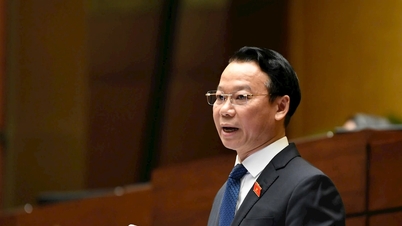
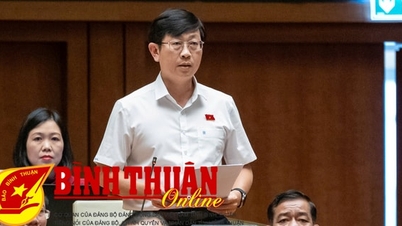
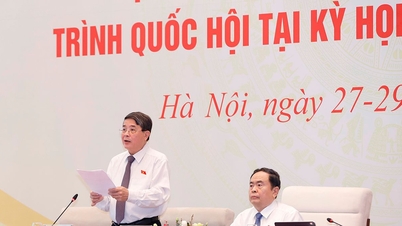

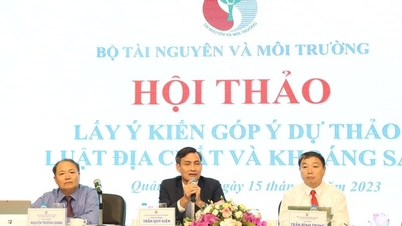







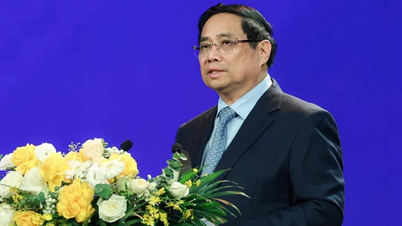

















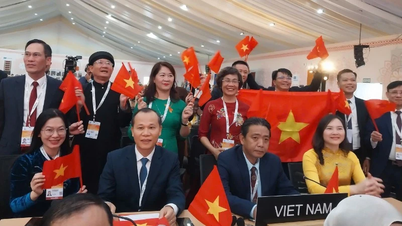






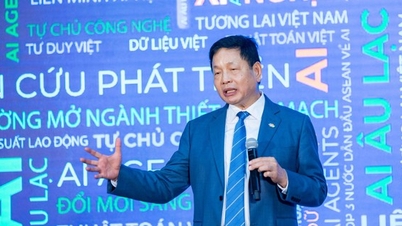





















![[Photo] Prime Minister Pham Minh Chinh attends the Vietnam Economic Forum 2025](https://vphoto.vietnam.vn/thumb/402x226/vietnam/resource/IMAGE/2025/12/16/1765893035503_ndo_br_dsc-8043-jpg.webp)































Comment (0)